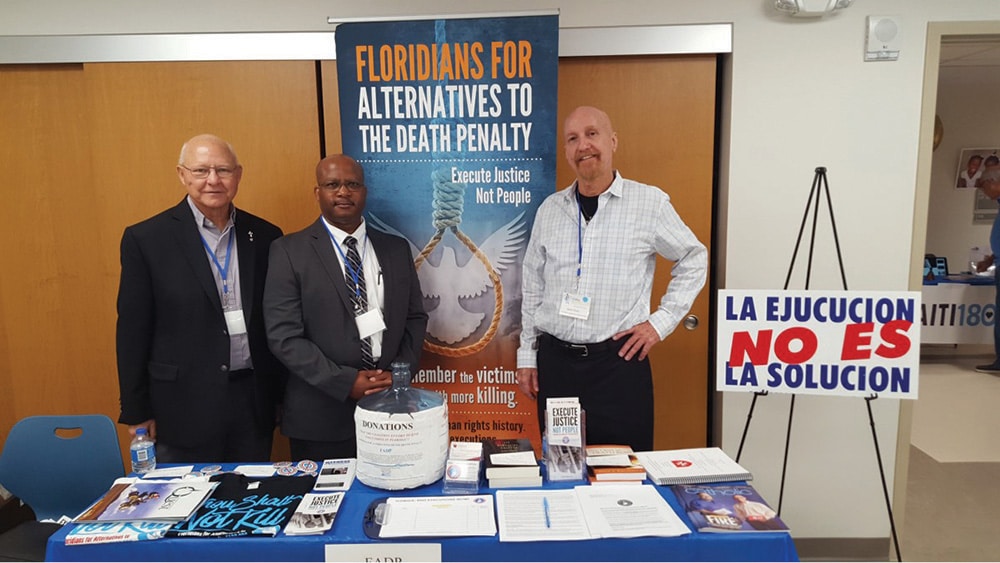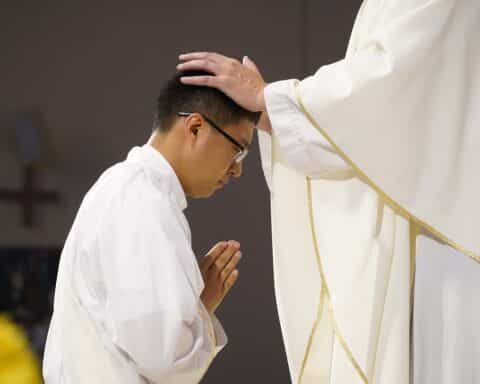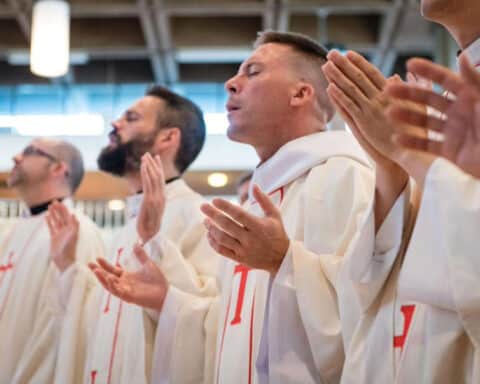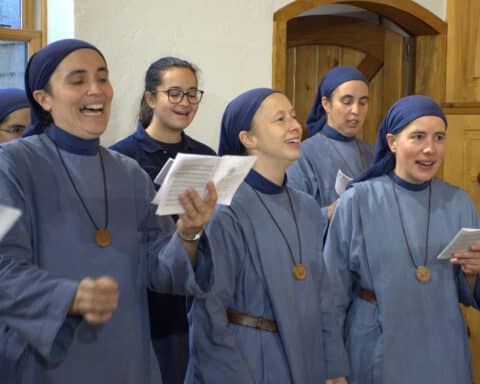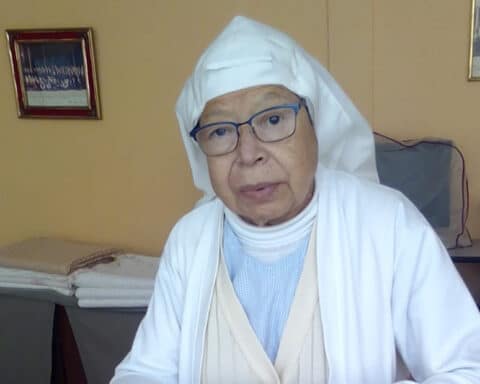Beyond the towers of barbed fences, razor-sharp wires and labyrinths of maximum-security checkpoints is a prison population isolated from those who share the inescapable message of God’s love. In an effort to mitigate the spread of COVID-19, inmate visitations have been suspended, holding captive prison ministry volunteers who rely on direct contact with prisoners to carry out their vocation.

For Deacon Lowell “Corky” Hecht, the director of prison ministry for the Diocese of St. Augustine, Florida, not being able to visit inmates is an added sentence for prisoners who already endure the abandonment of a society that disregards their humanity.
“The first thing these guys lose is their dignity as a person. They aren’t wanted by society anymore,” Deacon Hecht said. “We want them to know that there is nothing they have done that is irredeemable. We are there to remind them of that — to give them hope.”
Read additional vocation articles here.
The suspension of inmate visitations by the Florida Department of Corrections was established in order to stop the spread of the coronavirus. According to Deacon Hecht, close living quarters, where as many as 12 prisoners share a single toilet and sink, creates a tenuous living environment in which the virus can easily spread. In other prison areas, inmates are confined to a 7-foot by 9-foot cell without air conditioning. Deacon Hecht said that with summer temperatures in Florida easily reaching into the mid-90s outside, inside temperatures often rise to a sweltering 115 degrees. “In order to cool down, inmates take off their clothes, wash them in the toilet, wring them out, and lay on the concrete floor to cool off,” explained Deacon Hecht. “Can you imagine having a fever in that kind of heat?”
Cut off from ministry
Deacon Hecht, 66, acknowledges the risk involved in returning to prison ministry during a pandemic to both himself and the other volunteers — the majority of whom are in their 70s. While he would avoid going into the open population as a safety precaution, he is comfortable returning to self-contained areas such as a section of solitary confinement where there are 4-inch steel doors and plexiglass windows between him and the inmates. Deacon Hecht and volunteers from throughout the state minister to the inhabitants of correctional facilities in 17 different counties. He went as often as three times a week. But that was before COVID-19 took hostage this ministry, which brought spiritual and pastoral care to inmates through Mass, Communion services, prayer and companionship. The virus has also taken the lives of prisoners, as well.

According to data collected from the Marshall Project, a nonpartisan news organization seeking to create and sustain a sense of national urgency about the U.S. criminal justice system, as of Sept. 16, there have been a total of 1,017 reported coronavirus deaths in prisons. While nationwide there have been at least 121,217 reported cases of the virus among prisoners, Florida has recorded 15,740 positive cases, the second highest rate of infection nationally next to Texas. “Unfortunately, when COVID takes hold in one person, it spreads like wildfire,” said Deacon Hecht.
Still, Deacon Hecht is desperate to return to his vocation, calling the suspension of visitation “horrific.” He worries about the mental anguish, anxiety and abandonment caused by six months of forced isolation.
“We can only imagine what it must be like for them. There is very little communication between the facility management and the inmates, so sometimes we are the only person they get to see,” Deacon Hecht said. “I cannot tell you how many times an inmate has cried and told us that we are the only visitors they get.”
Deacon Hecht normally receives three to four letters a month from inmates, but since the suspension of visitation, he now receives at least that many in a week.
“Inmates write how they miss our prayers and said how often we were an answer to their prayers by showing up the day they needed it most,” Deacon Hecht said. “Some of the letters I receive clearly display the effect that isolation has on their mental health and sense of reality. They are frustrated, broken-hearted and feel abandoned.”
Per Florida Department of Corrections guidelines, prison ministers are not allowed to engage in written correspondence with inmates. While Deacon Hecht understands this intended safety measure, it is frustrating for him, because he can no longer respond to their letters during in-person visits as he has in the past.
Prayer and advocacy
Now, inmate correspondence simply goes unanswered — merely more of the enhanced isolation from the suspension of visitation that Bishop Felipe J. Estevez of the Diocese of St. Augustine calls inhumane. “This is a very urgent situation. They have been treated in a most inhumane manner,” he said.
Bishop Estevez worries about prisoners who have no encouragement, guidance or prayer. “Care of the mind and soul is as important as care of the health,” he said. Bishop Estevez believes that while visitations are suspended, the rules prohibiting letter-writing should be lifted, since it doesn’t pose a risk of infection. “Personal correspondence is essential to their mental health,” he argued. “They need that contact because they are already so isolated.”
Bishop Estevez also encourages the use of electronic media as a means of ministering to prisoners. “I am very perplexed that the authorities are not making a difference when they are capable of making a difference to their morale and well-being,” he said. “Why do prisoners have to be treated inhumane[ly]? It’s an already harsh environment. Why make it worse?”
To that end, Deacon Hecht has recently reached out to Mark Inch, the Florida Department of Corrections secretary, asking that inmates with access to a tablet be permitted to livestream or watch on-demand religious services. He has also requested that any religious volunteers be allowed to correspond with inmates until visitations resume.
While Deacon Hecht feels as if most of society is indifferent to the plight of prisoners, the recognition of the inherent dignity of every person is central to his vocation. This summer, Pope Francis emphasized the importance of upholding the dignity of every life while speaking via livestream from the library of the Vatican’s apostolic palace on Aug. 12. “While we work for the cure of a virus that affects everyone without distinction, faith urges us to work seriously and actively to fight indifference in the face of violations of human dignity,” the pope said.
For Deacon Hecht, who has been in prison ministry for the majority of his 29 years as a deacon, prayer and advocacy are the only ways he can serve prisoners right now. “I’m not doing what I thought the Holy Spirit called me to do when I took this position,” said Deacon Hecht. “We all miss being the messengers of hope and compassion.”
Speaking of Deacon Hecht and others in prison ministry, Bishop Estevez said: “We have a ministry to do. We have volunteers and personnel. We have a minority in goodness who are very caring. Jesus said, ‘when I was in prison you visited me.’ We don’t do it because they won’t let us.”
Lara Patangan writes from Florida.

